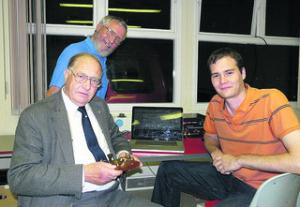Last Thursday we had a visit from Barrie Hudson of the Swindon Evening Advertiser. He has written an article about our hobby and club. It was published on Thursday 1st September and can be found on pages 14 and 15.
It is now available at http://www.swindonadvertiser.co.uk/news/local/9225874.Radio_days_are_here_to_stay/
IN the social hall in Savernake Street, James Patterson and his friends show me the letterbox-sized display occupying a laptop screen.
Known as a waterfall, the display has hundreds and thousands of tiny points of orange and green that march ceaselessly upward against a dark background.
And each of those points of orange and green is another human being or group of human beings in some place that might be anywhere in the world, watching their own computer displays or listening for voices or snatches of Morse Code.
Some are communicating with each other, some with satellites and some, perhaps, with the International Space Station Crew who circumnavigate the planet every 90 minutes or so.
To the layperson, amateur radio might seem to have no place in the modern, internet-driven world of communication, but amateur radio enthusiasts beg to differ.
“Amateur radio is still as much of a challenge as it was when it was first invented,” said James, a 32-year-old IT manager who lives in Shaw and chairs the 40-strong Swindon and District Amateur Radio Club.
“Just because the internet is around, it doesn’t mean that challenge isn’t there anymore. Every frequency band that we use has a different challenge.
“It would be very easy to sit with an X-Box and not do anything at all, but you don’t learn anything from that and you’re not doing anything different.”
“There’s always something else to learn,” said Tony, a lifelong enthusiast who will shortly join a group heading for Christmas Island in the Indian Ocean and try to transmit from there to fellow devotees worldwide.
He added: “Amateur radio is about making contacts.
“It’s how to find the right way to communicate with other people.
“It’s the excitement of getting in touch with somebody in another country, all off your own bat.
“It gets more challenging as the years go by. Some people bounce signals off the Moon.”
Although communicating with another country these days can be as easy as picking up a phone or booting up a computer, such things can easily be shut down by an accident, by a natural disaster, by a sinister government or by an act of terrorism.
None of these things can stop amateur radio, so it’s hardly surprising that networks of operators are part of contingency communication plans throughout the world – or that NASA and its astronauts have a programme called Ham Radios in Space.
“I’ve been involved for 57 years,” he said.
“And even at my age now, I still feel the sense of amazement at the fact that I can have a little piece of equipment sitting on a bench and contact the world.
“It can be very basic or it can be very complex.”
Becoming involved with the hobby has never been cheaper or more expensive, depending on how much a person is willing to spend.
A basic hand-held radio can cost as little as £50, while larger models with more power and features can cost from £500 to £8,000 or more. There are computer programmes to aid operators in finding, classifying and monitoring signals and a host of other high-tech gadgets that have only become available fairly recently.
It’s still possible, though, for a technically adept person to build their own equipment using readily-available plans and components.
Licensing for amateur radio is still necessary, and is a three-stage process with exams. Passing the first qualifies a person as an operator. Morse Code is no longer demanded, but it’s a skill many operators choose to learn.
And the future of the hobby? James and wife Samantha, herself a licensed operator, have a daughter, Amelia, who is nearly three.
“She already likes listening to Daddy’s radio,” said James with a proud smile.
Swindon and District Amateur Radio Club, whose website is www.sdarc.net, meets every Thursday at 7pm.
Thank you to Barrie and all members who participated.
